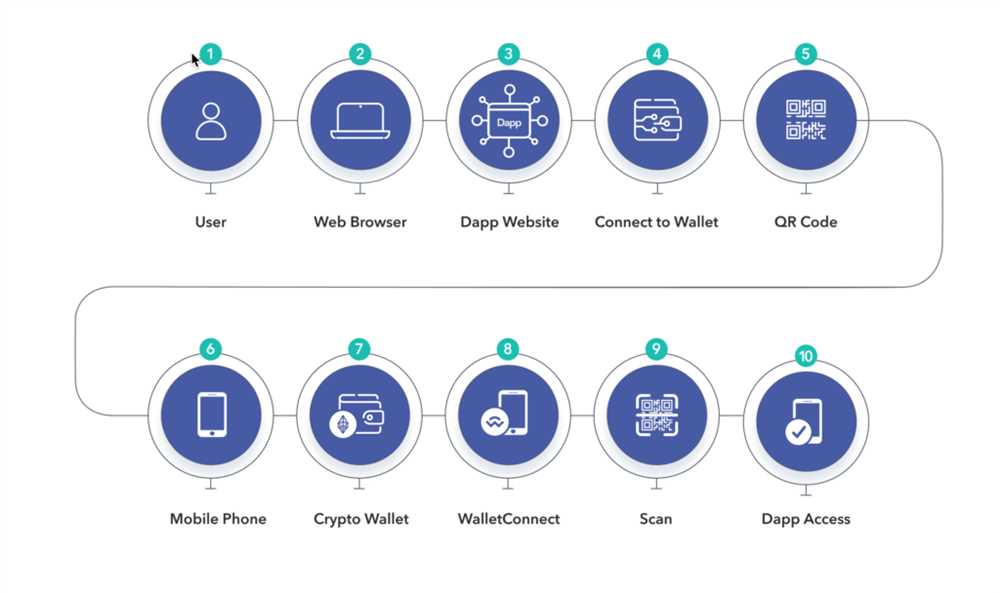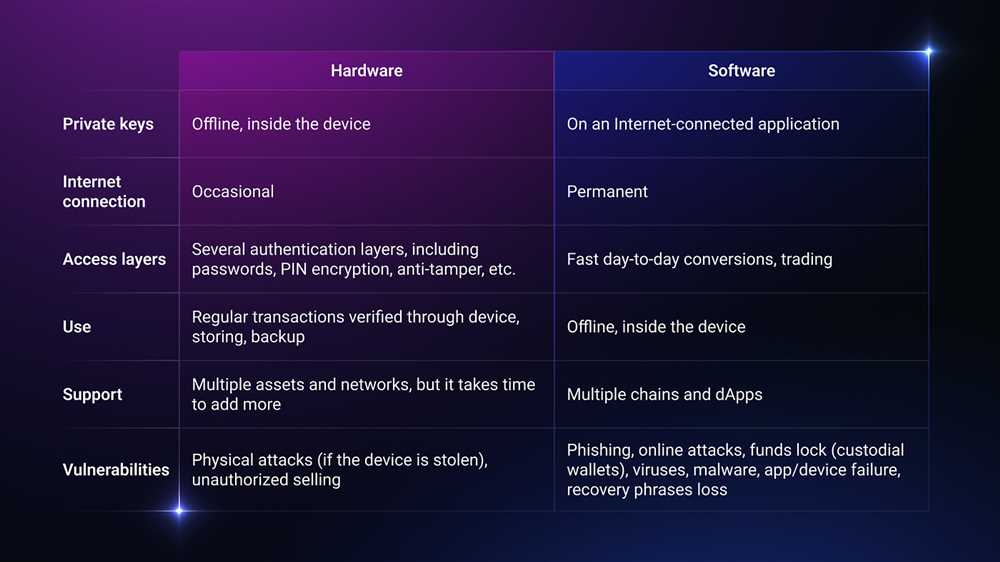The Evolution of Crypto Wallets: From Software to Hardware, and the Rise of 1inch

Discover the Next Generation of Crypto Wallets
Are you ready to take your cryptocurrency security to the next level? Say goodbye to software wallets and embrace the cutting-edge technology offered by hardware wallets. With the rise of 1inch, the evolution of crypto wallets has reached new heights.
Software Wallets: Vulnerable to Cyber Attacks
Software wallets have been the go-to choice for cryptocurrency enthusiasts for years. Convenient and easy to use, these wallets store your private keys digitally. However, they are susceptible to cyber attacks, putting your hard-earned crypto assets at risk.
Hardware Wallets: Maximum Security
Enter hardware wallets – the ultimate solution for safeguarding your digital wealth. These physical devices store your private keys offline, away from the prying eyes of hackers. With advanced security features and encryption, hardware wallets provide unmatched protection for your cryptocurrencies.
Introducing 1inch: Revolutionizing Crypto Wallets
1inch has revolutionized the crypto wallet landscape by combining the best of both worlds. With its unique multi-chain functionality, this decentralized exchange aggregator allows you to securely manage your assets across different blockchains, all within one integrated platform.
1inch also supports hardware wallets, ensuring the highest level of security for your digital assets. By leveraging the power of hardware wallets, 1inch has become the preferred choice for investors and traders looking for enhanced security and seamless user experience.
Upgrade Your Crypto Wallet Today
Don’t compromise on the security of your crypto assets. Upgrade to a hardware wallet and experience the evolution of crypto wallets with the rise of 1inch. Join the millions of users who have already made the switch and take control of your digital wealth like never before.
The Evolution of Crypto Wallets

Since the inception of cryptocurrencies, the need for secure storage and transactional capabilities has been paramount. Initially, software wallets emerged as the primary means of managing digital assets. These wallets were convenient but posed security risks due to their vulnerability to hacking and malware attacks.
To address these concerns, the crypto community began exploring alternative solutions, leading to the rise of hardware wallets. These physical devices are designed to securely store private keys offline, providing an added layer of protection against cyber threats. Hardware wallets typically utilize encryption and advanced security features to safeguard users’ digital assets.
The popularity of hardware wallets has grown exponentially as more individuals recognize the importance of protecting their investments. Today, prominent hardware wallet brands such as Ledger and Trezor dominate the market, providing users with peace of mind and a secure storage solution.
However, the evolution of crypto wallets doesn’t stop there. A new trend that has emerged in recent years is the integration of software and hardware wallets into multi-chain decentralized exchanges (DEXs). One such example is the rise of 1inch, a popular DEX aggregator that enables users to swap tokens across various liquidity sources.
1inch combines the convenience and accessibility of software wallets with the security benefits of hardware wallets. By integrating with prominent hardware wallet providers, 1inch ensures that users can securely manage their digital assets while taking advantage of the broad liquidity options offered by decentralized exchanges.
| Advantages | Disadvantages |
|---|---|
| Enhanced security | Cost of hardware wallet |
| Protection against hacking and malware | Physical loss or damage of the hardware wallet |
| Convenience and accessibility | Potential compatibility issues with different cryptocurrencies |
As the crypto industry continues to evolve, it is crucial for individuals to stay informed about the latest advancements in wallet technology. Whether it be software, hardware, or hybrid solutions like those seen in projects such as 1inch, securely managing digital assets is paramount in protecting one’s investments.
From Software to Hardware

In the early days of cryptocurrency, software wallets were the primary means of storing and accessing digital assets. These wallets, also known as digital wallets or e-wallets, were created as applications that could be installed on a user’s computer or smartphone.
Software wallets provided a convenient way for users to manage their cryptocurrencies, allowing them to send and receive funds, view transaction history, and secure their private keys. However, as the cryptocurrency market grew and security concerns became more prominent, hardware wallets emerged as a more secure alternative.
A hardware wallet, sometimes referred to as a cold wallet or a hardware security module (HSM), is a physical device that securely stores a user’s private keys offline. These devices are designed to protect against malware and hacking attempts, as they operate independently from the user’s computer or smartphone.
Hardware wallets typically come in the form of a USB device or a smart card. They use encryption and other security measures to ensure that the user’s private keys remain safe even if the device is lost or stolen. To access their funds, users simply connect the hardware wallet to a computer or smartphone and enter their PIN or passphrase.
The rise of hardware wallets has provided cryptocurrency users with a higher level of security and peace of mind. By keeping their private keys offline, users can mitigate the risk of their funds being compromised due to online threats such as phishing attacks or malware infections.
Furthermore, hardware wallets offer additional features such as multi-factor authentication and the ability to sign transactions offline, adding another layer of protection to users’ digital assets.
As the cryptocurrency ecosystem continues to evolve, hardware wallets are becoming increasingly popular among both individual users and institutional investors. Their robust security measures and user-friendly interfaces make them an essential tool for anyone looking to safeguard their cryptocurrency investments.
| Software Wallets | Hardware Wallets |
|---|---|
| Installed as applications on a computer or smartphone | Physical devices, such as USB devices or smart cards |
| Convenient, but more vulnerable to online threats | More secure, protected from malware and hacking attempts |
| Private keys stored online | Private keys stored offline |
| Less secure, risk of theft or hacking | Highly secure, protected even if the device is lost or stolen |
| Simple interface, easy to use | User-friendly interface, additional security features |
The Rise of 1inch

1inch is one of the most innovative platforms in the world of cryptocurrency. It has gained significant popularity and has become a leading decentralized exchange aggregator.
Founded in 2019 by Sergej Kunz and Anton Bukov, 1inch aims to address the issues faced by traders in the decentralized finance (DeFi) space. Its main goal is to provide users with the best possible prices and lowest slippage for their trades across multiple decentralized exchanges.
One of the reasons for 1inch’s rise to prominence is its efficient algorithm known as the Pathfinder. This algorithm enables the platform to find the most optimal paths for token swaps across various liquidity sources. By doing so, 1inch ensures that users can execute their trades at the best possible rates with minimal slippage.
Furthermore, 1inch offers a unique feature called the Chi Gastoken. This is an Ethereum gas token that can be utilized to reduce gas fees for transactions on the Ethereum network. By leveraging the Chi Gastoken, users can save on transaction costs, making it more cost-effective to trade on the 1inch platform.
1inch has also gained traction through its token, which is known as 1INCH. The token serves multiple purposes within the 1inch ecosystem, such as voting rights, liquidity mining rewards, and fee discounts. The 1INCH token has become increasingly valuable, attracting both traders and investors alike.
With its user-friendly interface, advanced technology, and commitment to providing traders with the best prices, 1inch has rapidly established itself as a key player in the DeFi space. Its rise has been driven by its ability to address the needs and concerns of traders and investors, offering them a seamless and efficient trading experience.
As the crypto industry continues to evolve, 1inch is poised to play a significant role in shaping the future of decentralized finance. With its innovative features and dedication to user satisfaction, 1inch is set to continue its upward trajectory, revolutionizing the way people trade digital assets.
The Future of Crypto Wallets

The evolution of crypto wallets has come a long way, from software-based wallets to the introduction of hardware wallets like the Ledger and Trezor. However, the future of crypto wallets holds even more exciting possibilities.
One of the key advancements we can expect to see in the future is the integration of biometric authentication into crypto wallets. With the rise of facial recognition and fingerprint scanning technology, it is only a matter of time before these features are incorporated into crypto wallets to provide an added layer of security.
Another area of development in the future of crypto wallets is the expansion of multi-chain support. As the crypto market continues to grow and more digital assets are created, users will need wallets that can store and manage a wide range of cryptocurrencies. Wallets that can seamlessly support multiple chains will become increasingly important.
In addition, we can anticipate the rise of decentralized exchanges integrated directly into crypto wallets. This will remove the need for users to transfer their funds to external exchanges, offering a more convenient and secure trading experience. Users will be able to make trades directly from their wallets, with the added benefit of maintaining control over their private keys.
Furthermore, the future of crypto wallets may also see the emergence of social features. Wallets may provide users with the ability to connect with friends and contacts, share transactions, and even make payments to each other. This social aspect could help to further mainstream the adoption of cryptocurrencies and make them more accessible to a wider audience.
Lastly, it is important to consider the advancements in user experience that will shape the future of crypto wallets. As the technology develops, we can expect wallets to become more intuitive and user-friendly, making it easier for both experienced and novice users to navigate the crypto world.
In conclusion, the future of crypto wallets holds great promise. With advancements in security, multi-chain support, decentralized exchanges, social features, and user experience, crypto wallets will continue to evolve and play a crucial role in the adoption and growth of cryptocurrencies.
Question-answer:
What is the evolution of crypto wallets?
The evolution of crypto wallets refers to the development and improvement of the technology used to store and manage cryptocurrencies. Initially, crypto wallets were solely software-based and stored the private keys to access and manage the digital assets. However, with the rise of hardware wallets, a more secure and convenient option became available. Hardware wallets are physical devices that store the private keys offline, providing an extra layer of security. The evolution of crypto wallets also includes the emergence of platforms like 1inch, which allow users to trade and swap cryptocurrencies directly from their wallets.
What are the advantages of hardware wallets?
Hardware wallets offer several advantages over software wallets. First and foremost, they provide enhanced security by keeping the private keys offline. This means that even if the computer or mobile device used with the wallet is compromised, the private keys remain secure. Additionally, hardware wallets often have built-in security features like PIN codes and encryption. They are also more resistant to malware and hacking attempts. Another advantage is the ease of use and compatibility with multiple devices. Most hardware wallets can be easily connected to computers and mobile devices, making it convenient to manage cryptocurrencies on the go.
How does the 1inch platform fit into the evolution of crypto wallets?
The 1inch platform is a prime example of how crypto wallets have evolved to offer more than just storage and management of digital assets. 1inch allows users to trade and swap cryptocurrencies directly from their wallets, without the need for additional exchanges. This integration of trading functionality within wallets streamlines the user experience and eliminates the need for multiple platforms. Users can access a wide range of decentralized exchanges and liquidity protocols through 1inch, ensuring the best possible rates for their trades. The platform also provides advanced features like limit orders and gas optimization for efficient trading.